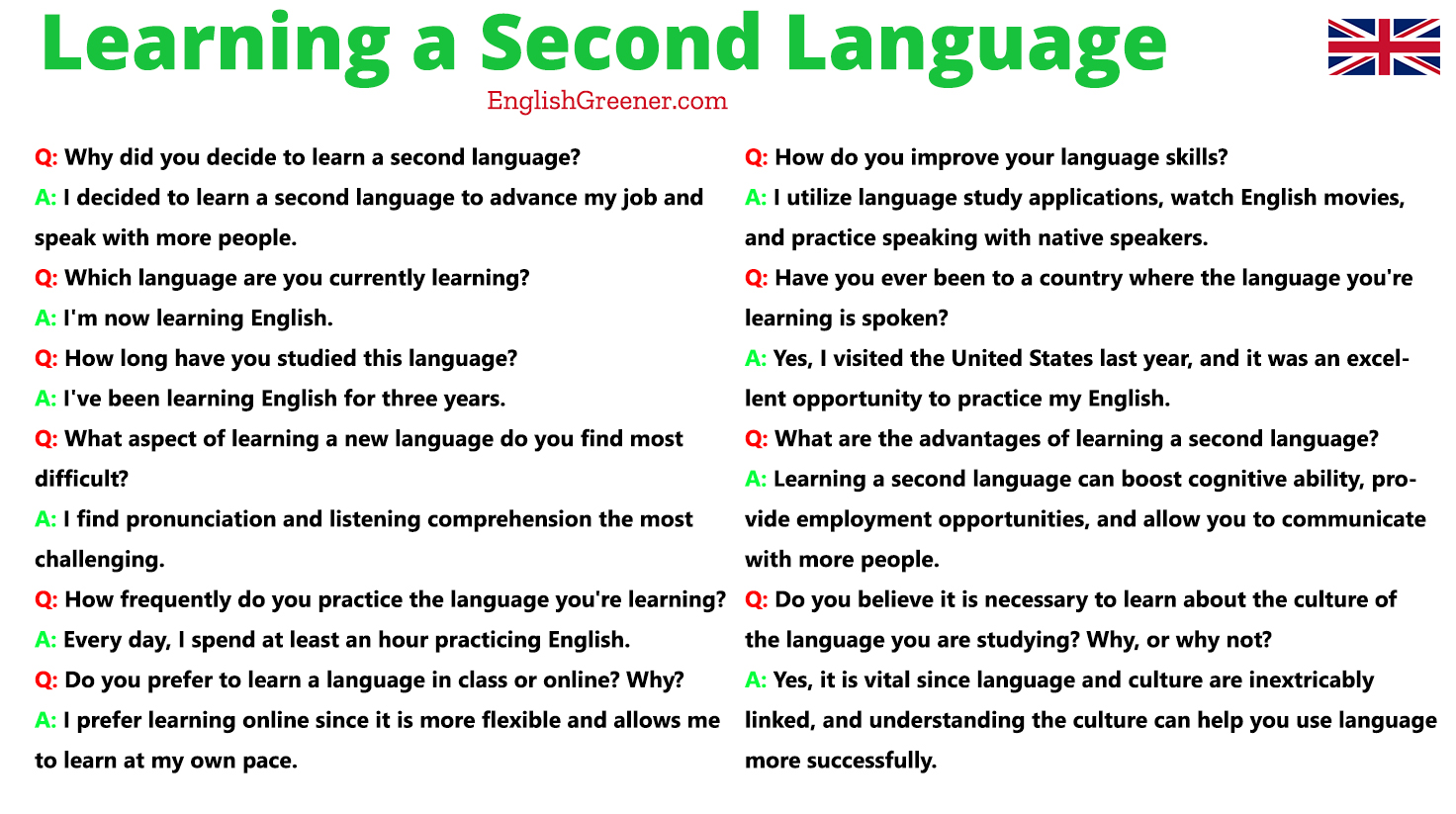Your cart is currently empty!

ESL English Conversation Questions and Answers about Learning a Second Language
This set of 20 ESL English conversation questions and answers focuses on the theme of learning a second language and is intended to help students practice speaking, listening, and understanding English. The questions go into numerous areas of language acquisition, including motives, problems, methods, and experiences. Each question is accompanied by an example answer, which serves as a model response and encourages students to express their own experiences and perspectives. This practice improves vocabulary and grammar skills while also encouraging lively discussions about the advantages, tactics, and personal journeys involved in learning a new language.
Question: Why did you decide to learn a second language?
Answer: I decided to learn a second language to advance my job and speak with more people.
Question: Which language are you currently learning?
Answer: I’m now learning English.
Question: How long have you studied this language?
Answer: I’ve been learning English for three years.
Question: What aspect of learning a new language do you find most difficult?
Answer: I find pronunciation and listening comprehension the most challenging.
Question: How frequently do you practice the language you’re learning?
Answer: Every day, I spend at least an hour practicing English.
Question: Do you prefer to learn a language in class or online? Why?
Answer: I prefer learning online since it is more flexible and allows me to learn at my own pace.
Question: How do you improve your language skills?
Answer: I utilize language study applications, watch English movies, and practice speaking with native speakers.
Question: Have you ever been to a country where the language you’re learning is spoken?
Answer: Yes, I visited the United States last year, and it was an excellent opportunity to practice my English.
Question: What are the advantages of learning a second language?
Answer: Learning a second language can boost cognitive ability, provide employment opportunities, and allow you to communicate with more people.
Question: Do you believe it is necessary to learn about the culture of the language you are studying? Why, or why not?
Answer: Yes, it is vital since language and culture are inextricably linked, and understanding the culture can help you use language more successfully.
Question: What is your favorite way to practice speaking the language you’re learning?
Answer: My favorite technique to practice speaking is to engage in conversations with native speakers.
Question: Are you using any language study apps? Which ones, specifically?
Answer: I use Duolingo and Memrise to improve my vocabulary and grammar.
Question: How do you stay motivated to continue learning a new language?
Answer: I make small, attainable goals and remind myself of the benefits of bilingualism.
Question: Have you ever taken a language proficiency exam? Which one?
Answer: I took the TOEFL test to determine my English competence.
Question: What is the most satisfying aspect of learning a new language?
Answer: The most satisfying aspect is being able to communicate with people from various cultures and understand their perspectives.
Question: Do you watch movies or listen to music in the language that you’re learning? How does it help?
Answer: Yes, I do watch movies and listen to music in English. It allows me to strengthen my listening abilities and learn new expressions.
Question: How do you deal with blunders when speaking a new language?
Answer: I view mistakes as learning opportunities and strive to correct them with the assistance of others.
Question: What advise would you give someone who is starting to study a second language?
Answer: Be patient, practice consistently, and don’t be scared to make mistakes.
Question: Do you believe that learning a second language is easier for children or adults? Why?
Answer: I believe it is easier for youngsters since they can learn new sounds and grammar structures more naturally.
Question: What are your long-term ambitions for learning this language?
Answer: My goal is to become fluent in English and use it professionally in my field.
